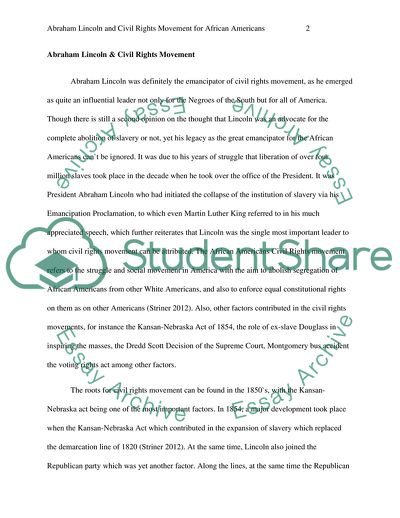Cite this document
(Abraham Lincoln as the Most Influential Perpetrator of Emancipation Proclamation Essay Example | Topics and Well Written Essays - 3000 words, n.d.)
Abraham Lincoln as the Most Influential Perpetrator of Emancipation Proclamation Essay Example | Topics and Well Written Essays - 3000 words. https://studentshare.org/history/1816110-discuss-the-view-that-abraham-lincolns-leadership-was-the-most-important-factor-in-bringing-civil-rights-to-african-americans-in-the-period-1850-1950
Abraham Lincoln as the Most Influential Perpetrator of Emancipation Proclamation Essay Example | Topics and Well Written Essays - 3000 words. https://studentshare.org/history/1816110-discuss-the-view-that-abraham-lincolns-leadership-was-the-most-important-factor-in-bringing-civil-rights-to-african-americans-in-the-period-1850-1950
(Abraham Lincoln As the Most Influential Perpetrator of Emancipation Proclamation Essay Example | Topics and Well Written Essays - 3000 Words)
Abraham Lincoln As the Most Influential Perpetrator of Emancipation Proclamation Essay Example | Topics and Well Written Essays - 3000 Words. https://studentshare.org/history/1816110-discuss-the-view-that-abraham-lincolns-leadership-was-the-most-important-factor-in-bringing-civil-rights-to-african-americans-in-the-period-1850-1950.
Abraham Lincoln As the Most Influential Perpetrator of Emancipation Proclamation Essay Example | Topics and Well Written Essays - 3000 Words. https://studentshare.org/history/1816110-discuss-the-view-that-abraham-lincolns-leadership-was-the-most-important-factor-in-bringing-civil-rights-to-african-americans-in-the-period-1850-1950.
“Abraham Lincoln As the Most Influential Perpetrator of Emancipation Proclamation Essay Example | Topics and Well Written Essays - 3000 Words”. https://studentshare.org/history/1816110-discuss-the-view-that-abraham-lincolns-leadership-was-the-most-important-factor-in-bringing-civil-rights-to-african-americans-in-the-period-1850-1950.


